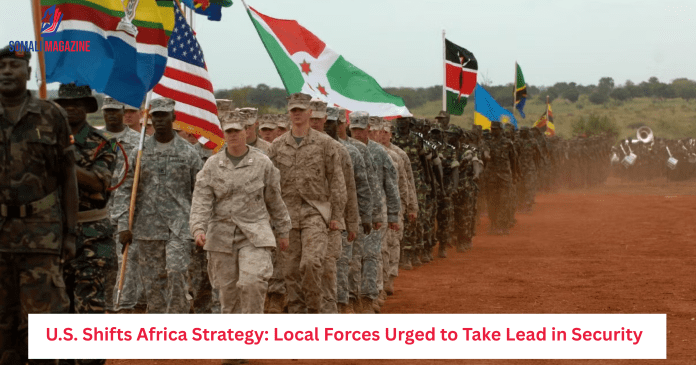Facebook Twitter (X) Instagram Somali Magazine - People's Magazine
As extremist threats grow, Washington moves away from governance-focused aid, calling on African allies to manage their own defense
The U.S. military is changing how it operates in Africa. Instead of focusing on building good governance and addressing the root causes of conflict, it now wants its African partners to take more responsibility for their own security.
This new approach was clear during African Lion, the largest joint military training exercise the U.S. holds on the continent. General Michael Langley, the top U.S. military leader in Africa, said the goal is to help African forces reach the level where they can operate independently.
“There needs to be some burden sharing,” Langley said, emphasizing that the U.S. can’t do everything on its own. He noted that supporting other countries, like Sudan, must now come with shared responsibility. The U.S., he said, is focused on protecting its own homeland and expects partners to do more in handling regional instability.
For four weeks, troops from over 40 countries practiced responding to threats by air, land, and sea. They flew drones, conducted close-quarters combat drills, and launched satellite-guided rockets in the desert. While these activities were similar to previous years, what changed was the messaging. The U.S. is no longer emphasizing the idea of combining military, diplomacy, and development to address deeper issues like poverty or weak governance.
Previously, Washington promoted this “whole of government” strategy as a better alternative to the more military-only focus of rivals like Russia and China. Now, the U.S. talks more about building partner capacity and letting African governments take the lead in securing their regions.
China, meanwhile, has launched its own military training programs for African countries. Russian mercenaries are also strengthening their influence across North, West, and Central Africa, becoming the main security partners for some governments.
Just a year ago, Langley himself defended the U.S. approach of combining development with defense. He said real security in Africa required addressing issues like climate change, poor farming conditions, and weak governance. He even pointed to Ivory Coast as a success story where investment in both development and defense had reduced extremist attacks.
But such examples are rare. Langley, who is expected to step down later this year, admitted that progress has been uneven. Some countries have improved, while others have fallen back into chaos.
Despite the shift in strategy, African armies still face serious challenges. Most are poorly equipped, and insurgent groups like al-Qaida and Islamic State (IS) are gaining ground. A senior U.S. defense official recently said Africa has become the epicenter for both terror networks, with IS now directing operations from the continent.
The U.S. has about 6,500 troops stationed in Africa and has spent hundreds of millions of dollars on security assistance. However, Africa has never been a top priority for the Pentagon. Now, with global tensions rising, the U.S. wants a smaller, more focused military presence.
In Somalia, for example, the U.S. has increased airstrikes against extremist groups. But Langley admitted that Somalia’s national army still struggles to keep control on the ground. “They are trying to find their way,” he said, noting that while the army has made some progress, it still lacks critical resources.
The situation in West Africa is also troubling. Most countries there don’t have strong air forces and struggle to monitor militant activity due to poor infrastructure and difficult terrain. Western countries have also pulled back their involvement in the region, either voluntarily or after being pushed out by military-led governments.
Security expert Beverly Ochieng said that even before the West reduced its role in the Sahel, African armies lacked the tools to fight growing threats. Now, with less outside help, the gap is even wider.
As extremist groups expand and violence spreads, the U.S. military wants African countries to take more control. But many experts worry that without enough support, they simply won’t be able to.

